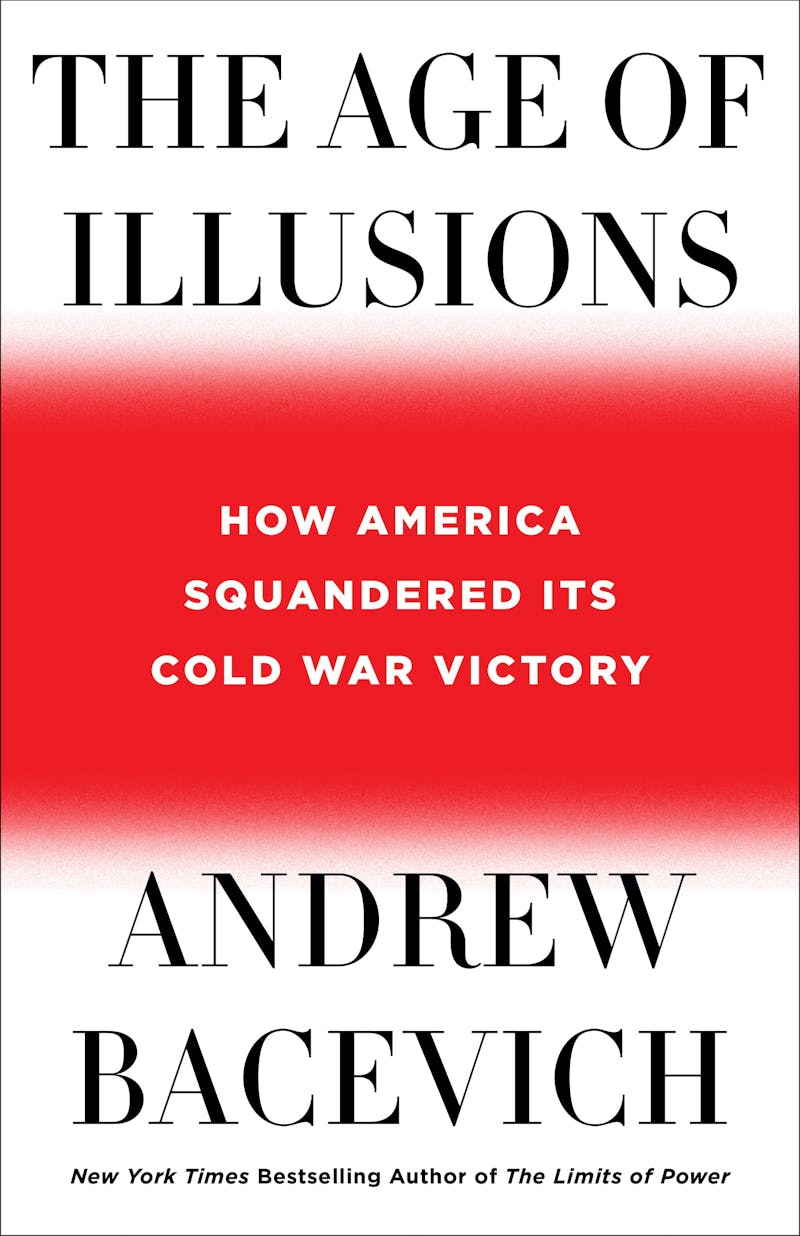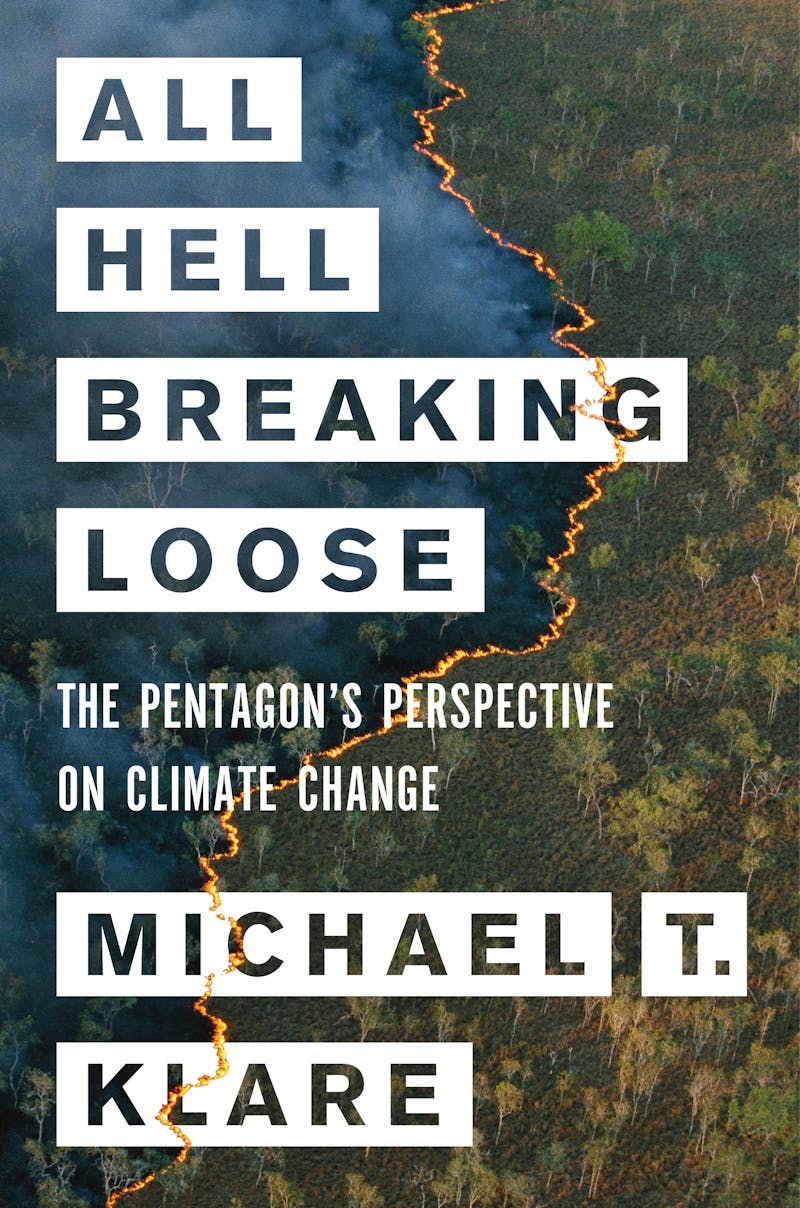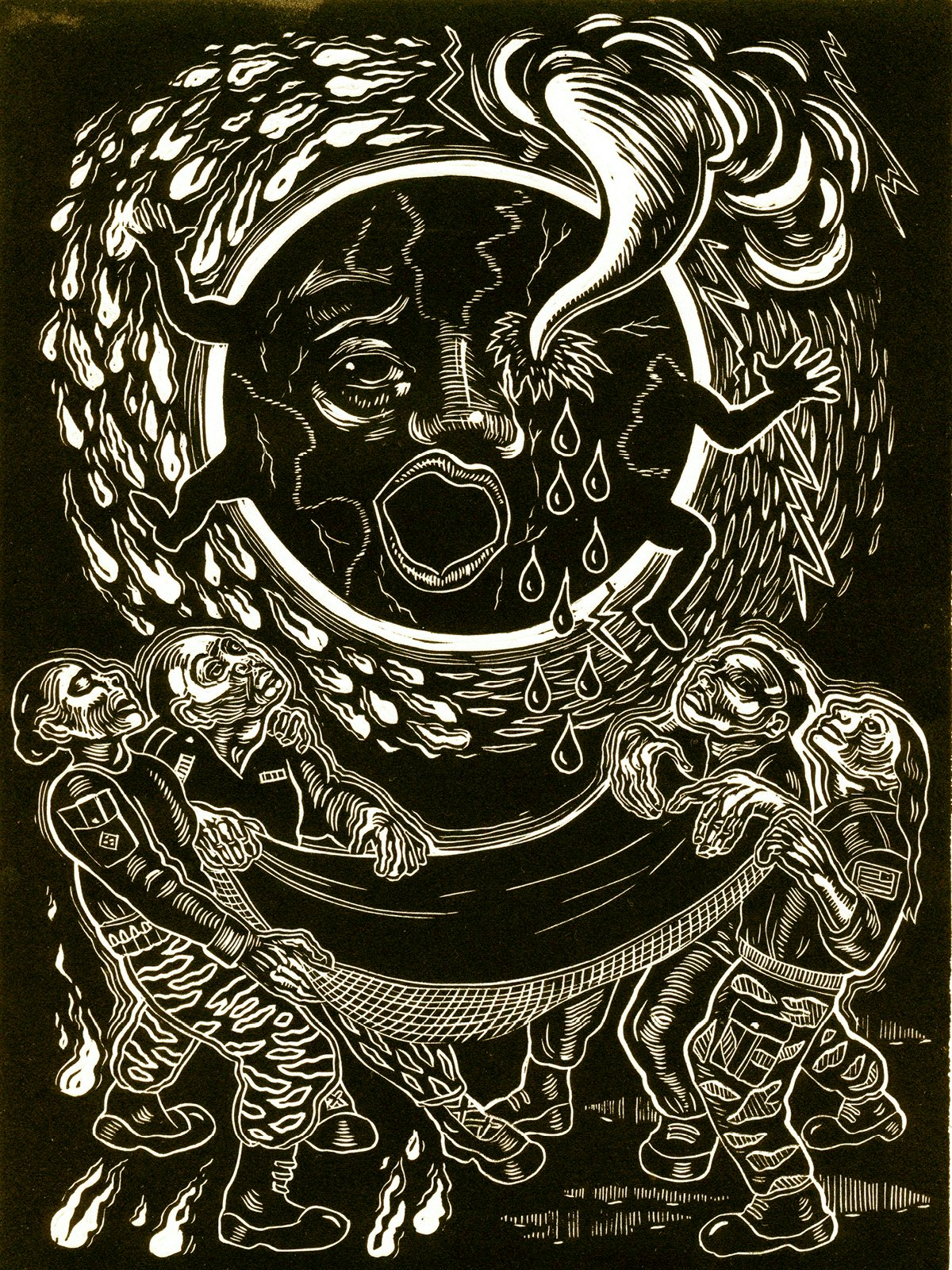Climate change will define the global political landscape of the twenty-first century. As Admiral Samuel J. Locklear III, then the head of the U.S. Pacific Command, told journalists in 2013, political upheaval caused by climate change “is probably the most likely thing that is going to happen … that will cripple the security environment, probably more likely than the other scenarios we all often talk about.” Events since then have not weakened that assessment: As governments around the world have struggled to cope with supersize tropical storms, drought, wildfire, rising seas, glacier melt, desertification, epidemics, and unprecedented heat waves, there has been a surge in regional instability, civil wars, border skirmishes, mass displacement, and tensions around shifting geographical boundaries, all of which are reshaping national and international politics from the Mediterranean to the South China Sea, from the Arctic to the Rio Grande.
The American foreign policy establishment—the broad coalition between Washington, the military-industrial complex, major think tanks, and the mass media, identified by Ben Rhodes’s resonant phrase as “the Blob”—has been struggling to cope with this fact since the mid-2000s. In the tumultuous twenty-first century, the United States will face global and regional instability, threats to energy and food security, new conflicts over resources and borders, and direct assaults on key infrastructure from superstorms and rising seas. As early as 2007, CNA Corporation, a Pentagon-funded think tank, declared climate change “a serious threat to America’s national security,” and recommended making it a central factor in U.S. strategic planning.
As Michael T. Klare discusses in his recent book, All Hell Breaking Loose, the Pentagon made serious efforts for nearly a decade to assess, confront, and address climate change, from the Department of Defense 2014 Climate Change Adaptation Roadmap to the launch of the guided-missile destroyer U.S.S. Stockdale, which in 2016 became the first U.S. naval vessel powered by alternative fuels (a mixture of petroleum and beef fat). Yet those efforts were halted in 2017 by Trump’s Executive Order 13783, “Promoting Energy Independence and Economic Growth,” which commanded federal agencies not only to abandon planning and preparing for climate change, but also to abolish rules or regulations they’d previously adopted.
The challenge climate change poses to global politics, international security, and American foreign policy emerges in a moment when the United States’ understanding of its role in the world is uncertain. The postwar liberal order that the United States built out of the bombed ruins of Europe and East Asia has collapsed, repudiated at home and disgraced overseas. Trump seems to be running his foreign policy on impulse, without a clear plan, and with an understaffed executive branch. Feckless Democrats waffle between nostalgia for Obama’s “Empire Lite” and fervid calls to abolish ICE. Meanwhile, bruise-colored clouds mass at the horizon, and the first drops of rain flicker on our faces.
Into this gloomy muddle comes Andrew Bacevich, professor emeritus of history and international relations at Boston University, author of the bestselling books The Limits of Power and Breach of Trust, conservative Catholic and liberal darling, trenchant critic of American militarism, and president of a new Washington think tank, the Quincy Institute for Responsible Statecraft. Although his latest book, The Age of Illusions: How America Squandered Its Cold War Victory, does not overtly address climate change until its closing pages, it offers a thoroughgoing critique of the post–Cold War elite consensus that, in Bacevich’s view, has led to the mess we now find ourselves in. (I should add that I know Bacevich professionally, and we serve together on two different advisory boards, Veterans for Peace and the Notre Dame International Security Center.)

Bacevich sees the United States’ victory in the Cold War as a windfall that turned out to be a curse, comparing it to winning the lottery. In the decades since 1989, he argues, American society has been undermined by the vices of undisciplined success. “Unconstrained corporate capitalism operating on a planetary scale,” hubris, greed, reckless military adventurism, a “new conception of freedom” de-emphasizing moral responsibility, and an unbalanced system of governance giving undue power and status to the president have all led to an unjust redistribution of wealth, foreign policy disasters like the invasion of Iraq, an alienated and disaffected electorate, and the election of Donald Trump. Ecumenical in its criticisms, blaming both Republicans and Democrats, both voters and their elected representatives, The Age of Illusions argues that the seeming apex of American power in the 1990s may have been the very moment of its undoing.

This will sound familiar to Bacevich’s readers: It more or less reprises the argument he’s been making since 2004, in countless essays and several books, most persuasively in The Limits of Power. What sets this new book apart is how Bacevich foregrounds the question of what American foreign policy means. The Age of Illusions begins with a quote from the fictional Harry “Rabbit” Angstrom, the protagonist of John Updike’s Rabbit novels: “Without the Cold War, what’s the point of being an American?” This is the riddle that motivates Bacevich’s book, a puzzle Bacevich argues has yet to be solved. How do we understand ourselves as a nation, in the world, without a clear sense of a mission or an antithesis against which to define ourselves?
In attempting to answer this question, The Age of Illusions swerves from a purely historical argument into autobiographical, even literary, territory, particularly through the book’s uncanny double through line: While reprising his well-polished argument about the end of the Cold War being a self-defeating victory, Bacevich discusses not only relevant moments from his own life, such as his combat tour in Vietnam, his early retirement from the military, and his growing unease with American hegemony in the 1990s, but also moments from the life of his coeval Donald J. Trump. Political turning points such as the electoral defeat of George H.W. Bush and the gay rights milestone of Obergefell v. Hodges are woven into the life stories of Andy and Don, two baby boomers born within 13 months of each other, as we follow them from the hazy idylls of the ’50s to the strife of the ’60s to the decades of hubris and greed that characterize, for Bacevich, post–Cold War America. And as Bacevich tracks his own late-stage transition from professional soldier to public intellectual, Trump comes more and more to occupy center stage, turning The Age of Illusions into something different and more interesting than it purports to be.
Despite claiming to be a work of history, that is, The Age of Illusions turns out to be a book about the meaning of Donald Trump’s ascension to the presidency. Bacevich’s historical narrative is ultimately the lead-in and context for his deeper argument, which is that Trump’s election should be understood as a pivotal referendum on the guiding precepts of American life since 1989, namely globalization, militarism, executive power, and liberal individualism. “By 2016,” Bacevich writes, “large numbers of ordinary Americans had concluded, not without reason, that the post–Cold War consensus was irretrievably defective.”
The idea that nearly 63 million Americans voted for a reality TV host in protest against American foreign policy, personal autonomy, globalization, and a strong unitary executive may seem counterintuitive. Obviously, it’s simpler to believe that Russian hackers used Facebook to hijack American democracy. And it’s true that Bacevich underplays (without ever dismissing) a range of issues that were key to Trump’s election, not least immigration.
But Bacevich has a powerful if somewhat obscured point, which is that the role of the United States in the world is one of the most important ways people understand what it means to be American. Which is to say, foreign policy matters, even when voters don’t articulate it as an important issue. While American life from 1945 to 1989 cannot be adequately or realistically described by reference to the myth of Cold War unity, as Bacevich sometimes argues, that myth had real power. Being an American meant being part of a political collective that defined itself in opposition to Soviet Russia, widely seen as godless, communist, and totalitarian. Hence being American meant being godly, capitalist, and free. You could be for it or against it, but at least you knew what “it” was. Today, according to Bacevich, we lack any such clarity, and the republic is blighted with rancor, narcissism, arrogance, and irresponsibility—not just in Trump, but in the body politic.
Yet although Bacevich is pessimistic about both Trump and the establishment against which Trump rails, he nevertheless remains hopeful about the United States: “Real change is possible,” he writes. “Previous chapters in U.S. history suggest that it occurs when the American people rally around a large cause that obliges officeholders to take note or be sent packing.” Bacevich sees exemplary moments of American solidarity in abolitionism, the Progressive movement, and the public response to the Great Depression and World War II. He sees a “comparable cause” on offer today: climate change.
In the book’s final pages, Bacevich argues for seeing Trump’s election as an opportunity to shake off the moral and ideological drift of the post–Cold War era, unite as a people, and find new moral purpose in an appropriately expansive American project. “The imperative of addressing climate change,” he writes, “may one day offer a suitable replacement for the disastrously misguided consensus foisted on the American people after the fall of the Berlin Wall. Here, in sum, are the makings of a suitable answer to Rabbit Angstrom’s question.” Bacevich’s stance on climate change seems to be, somewhat ironically, that it offers a chance to make America great again.
What should American foreign policy look like in an age defined by cataclysmic ecological rupture? Do our vast national wealth and inherited responsibility for historical carbon emissions lay on us an ethical obligation? Are we willing to sacrifice some of our own comfort to help those suffering from our profligacy and neglect? Would U.S. citizens be willing to not only reduce our own carbon emissions, but also take on the task of compelling others to reduce theirs? Would we go to war to make China or India decarbonize?
Thinking about these difficult questions, I couldn’t help but see a contradiction between Bacevich’s rhetorical turn toward climate change at the end of The Age of Illusions, and his position as the president of the Quincy Institute for Responsible Statecraft. The Quincy Institute has emerged as a strong advocate for “restraint” in American foreign policy—its fellows have argued that United States should disengage militarily from the Middle East and Southwest Asia, abjure state-building, base its foreign policy on “more diplomacy and less coercion,” force U.S. allies to bear their fair share of costs for global and regional security, decrease military spending, and, in the words of deputy director Stephen Wertheim, “end America’s commitment to armed supremacy and embrace a world of pluralism and peace.” All well and good.
Yet climate change–driven destabilization has created and will continue to create situations that call for military intervention, coercion, and even state-building: As Klare discusses in All Hell Breaking Loose, the U.S. military has already been crucial to international disaster relief efforts in the Philippines, Mozambique, and Liberia, and has intervened in climate-related conflicts in Mali and Syria. Such efforts, while limited and often inadequate, are only going to grow more necessary as the Earth’s climate continues to transform. The Quincy Institute takes its name from President John Quincy Adams, and its tagline from Adams’s famous decree that America “goes not abroad in search of monsters to destroy.” But what do we do when the Godzilla of climate change—a monster created in large part by American consumption—goes on a global rampage?
All Hell Breaking Loose delineates “a spectrum of increasingly severe disasters resulting in ever more complex and demanding missions for American military forces,” which Klare describes as a “ladder of escalation.” Klare’s ladder—based on Pentagon and intelligence reports, as well as congressional testimony and dozens of interviews—rises from simple disaster relief to extended operations in failing states facing climate-driven collapse, then to complex multinational deployments in response to interruptions in global energy infrastructure or food supply chains, then to major power conflicts over resources and borders, and finally to climate-driven emergencies in the United States itself.
All of these scenarios would put significant pressure on military operational tempo, challenge traditional ideas about intervention (including restrictions on the use of military force within the United States), and demand continued support for a large military able to deploy swiftly around the world. Such scenarios might well include different degrees of nation-building, counterinsurgency, and preemptive intervention. They might also include efforts to stabilize failed states and “uncontrolled spaces”—precisely the kind of messy, ill-defined, long-term mission from which the Pentagon finds itself unable to escape in Afghanistan.
Although I think of myself as both an anti-militarist and an anti-interventionist, have written at length about the calamitous American war in Iraq (in which I participated as a soldier), and am deeply sympathetic to Bacevich’s work and the need for restraint in American foreign policy, I cannot help but admit that even a reasonable anti-militarist position faces serious challenges when it comes to coping with the emergent turmoil of global climate change. Avoiding troublesome military entanglements in the Middle East and Africa would mean standing idly by while innocents suffer, states collapse, and zones of chaos spread. Repudiating the hubris of American exceptionalism could also mean negligently abjuring any special responsibility for the exceptional wealth and power the United States enjoys. Protecting our men and women in uniform and holding back our military power might be no more than craven rationalization for refusing to use that power to help those in need.
In order to begin to answer the question of what it means to be American today—the question Bacevich takes from Rabbit Angstrom—we need a coherent foreign policy that makes sense of the United States’ role in a world being radically transformed by, among other things, the unintended consequences of American prosperity. We need a vision for the United States’ role in a world defined by climate change.
One possibility would be for the United States to see its wealth and its responsibility for historic greenhouse gas emissions as placing on it an obligation for leadership. Such leadership would include taking the initiative on a global energy transition, supporting other countries’ efforts at transition, and even enforcing standards for transition among those nations that prove recalcitrant. Such leadership would also by necessity include taking a major role in dealing with natural disasters, political instability, and threats to global and regional security. This role would be diplomatic, but it would also be military: The United States military is the only force today capable of multiple rapid global deployments in response to humanitarian crises, and the only force capable of compelling limits on greenhouse gas emissions.
As with the Green New Deal, the idea of transforming the military into a “Climate Force” is reductive and beset with numerous difficulties. Yet it is at least an idea, and one that attempts to engage with the scale and urgency of the problems we face with catastrophic climate change, which is more than one can say about most foreign policy proposals today. What we urgently need, as Bacevich writes in The Age of Illusions, is “real debate about real choices,” debate that brings together scientists and soldiers, activists and conservatives, visionaries and critics, then confronts them with the existential crises of planetary ecological collapse and climate transformation.
In The Age of Illusions, as in his other books, Bacevich shows himself to be an astute and unrelenting critic, a great dispeller of imperialist illusions. The need for such disillusionment cannot be overstated. But it’s also not enough. We face in our lifetime the greatest challenges human civilization has ever confronted. These challenges are inescapable, for even if we stopped burning fossil fuels entirely today, the climatic and ecological ramifications of 200 years of extraction, environmental mismanagement, and reckless waste will continue playing out for millennia.
There is little evidence to suggest that human beings will find a way to manage this catastrophe, or that global civilization will persevere in some now-recognizable form. Any faith we might have in the future must be based on a realistic assessment of our situation and a willingness to find practical solutions, even if they’re dissatisfying, incomplete, or compromised. All hell is truly breaking loose, as Klare suggests in his book’s title. We either accept that grim fact and try to find a way forward, making allies with ideological opponents and focusing on salvaging what we can, or we doom ourselves to bickering fruitlessly about who gets which deck chair while 5,000 years of collective human effort break apart under crashing waves of violence and disaster. The twenty-first century will be defined by climate change. Who we are as Americans, and how we are remembered, will be defined by what we do about it.
